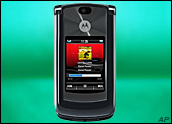
Motorola announced a series of new phones Tuesday, and while all of them have interesting form factors and compelling features, only one — the Razr 2 — has the potential to compete with Apple’s upcoming iPhone.
The reasons?
There are three: form, function and sex appeal.
“People buy this class of phone for the cache of being distinctive, of being cool for having the next best thing and both phones cross over in that space,” Rob Enderle, principal analyst of the Enderle Group, told TechNewsWorld.
The Razr 2 comes closer to what people have historically bought in this class of phone. Its predecessor also targeted that segment and came out a winner. When the original Razr first hit the market three years ago, it cost several hundred dollars; more recently it’s been selling at US$50 or less, with the price often subsidized by cellular service carriers.
The Form
The Razr 2’s form factor is now 2 millimeters thinner, is sleeker and sports a two-inch screen on the outside of the handset. The screen on the inside is twice the resolution of the original Razr, and the body is constructed of durable stainless steel.
“The new Razr is small, sexy, it is not complex and it hits on all the points that [have] been driving the phone market for some time,” Enderle said. “The iPhone is big, comparatively complex, and the only real difference is, it’s coming from Apple, and Apple is clearly a marketing powerhouse.”
The Function
Motorola’s latest smartphones, the Moto Q 8 and Moto Q 9, are in some ways designed to compete against the iPhone, but they’re more likely to be factors for business-class customers making a decision between a BlackBerry device or another smartphone like the Samsung Blackjack.
Motorola’s new music phone, the Rokr Z6, focuses the music-loving phone buyer. With its external memory microSD card slot, it can hold up to 1,000 songs. Few analysts, however, believe any general purpose music phone is a contender for consumers who are seriously considering an iPhone.
Likewise, the Moto Z8, which the company calls a “Media Monster,” boasts video playback at 30 frames per second and has up to 32 GB of expandable memory. The downside is that it’s only available in Europe and Asia in June, so buyers in the U.S. won’t even have one to look at if they want a phone capable of playing movies.
The Razr 2, while not a standout in any area of function, provides a solid level of overall functionality. The new ARM 11 processor is ten times faster than the original’s, and Motorola says the user interface is redesigned to provide faster access to regularly-used features.
It also provides playback for up to 1,000 songs, includes a full HTML browser, automatically adjusts volume in relation to ambient noise and will be available on all three of the major cellular technology networks: Cingular, Verizon and Sprint Nextel. The iPhone will be GSM-capable only, and only available through a single carrier, Cingular.
The Sex Appeal
“The new Razr seems to have the same kind of cachet of the old Razr and some of the similarities, so it may not be distinctive enough,” Enderle noted. “But that’s what we’ll find out from the market. If this wasn’t Apple in the mix, it would be a no-brainer … but just because you had the last trendy phone, much like Sony discovered with the Walkman, doesn’t mean you have the next hit.”
Regardless of the options available to buyers come June, Enderle believes that Apple and Cingular will sell “a ton” of iPhones the first week. The real question is, what’s going to happen after that?
The Razr 2 will hit several markets in July.



















































